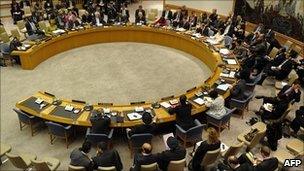Libya: Gaddafi in spotlight at UN Security Council
- Published

The UN Security Council is meeting to consider action against Colonel Muammar Gaddafi's government in Libya over its attempts to put down an uprising.
A draft resolution calls for an arms embargo, travel ban and asset freeze.
It also proposes referring Col Gaddafi to the International Criminal Court for alleged crimes against humanity.
Meanwhile, US President Barack Obama has, for the first time, said the Libyan leader should step down and leave the country "now".
The White House said Mr Obama made his position clear to German Chancellor Angela Merkel during a telephone conversation on Saturday evening.
"The president stated that when a leader's only means of staying in power is to use mass violence against his own people, he has lost the legitimacy to rule and needs to do what is right for his country by leaving now," it said in a statement.
Earlier, one of Col Gaddafi's sons, Saif al-Islam, insisted that normal life was continuing in three-quarters of Libya. By contrast, anti-Gaddafi forces say they control 80% of the country.
Each side's claims are difficult to confirm but it is known that the opposition controls the second city Benghazi, while Col Gaddafi still controls the capital Tripoli, home to two million of the country's 6.5 million population.
The UN estimates more than 1,000 people have died in the 10-day-old revolt.
The global body's World Food Programme has warned that the food distribution system is "at risk of collapsing" in the North African nation, which is heavily dependent on imports.
UN Secretary General Ban Ki-moon has demanded "decisive action" over the Libya crisis by the Security Council. The draft resolution it is considering is backed by Britain, France, Germany and the US.
The Libyan delegation at the UN has sent a letter to the Security Council backing measures to hold to account those responsible for armed attacks on Libyan civilians, including action through the International Criminal Court.
The BBC's UN correspondent Barbara Plett says the main point of contention in the draft resolution is the proposal to refer Libya to the court, so the Libyan delegation statement will put pressure on those in the council who oppose the reference or want to water it down.
The US has already imposed sanctions against Libya, and closed its embassy in Tripoli.
Evacuation
Thousands of foreign nationals - many of them employed in the oil industry - continue to be evacuated from the country by air, sea and land.
Saturday saw two British military transport aircraft pick up about 150 foreign nationals in the desert south of Benghazi and fly them to the Mediterranean island of Malta.
Britain also announced it had temporarily closed its embassy in Tripoli and pulled out its staff on the last UK government-chartered aircraft because of the deteriorating security situation.
BBC Middle East editor Jeremy Bowen, at Tripoli airport, reports that about 10,000 people remain outside the terminal building and several thousand more are inside. He saw piles of discarded luggage and personal possessions, even TVs, abandoned by people who've been desperate to get out.
Most of the people trying to leave are Egyptians, and many of them told our correspondent they had been waiting there for seven days.
Friday saw Col Gaddafi make a defiant address to supporters in Tripoli and reports of anti-government demonstrators in several areas of the city coming under fire from government troops and pro-Gaddafi militiamen.
On Saturday the capital city was calm, with shops open and people on the streets. A Libyan journalist told the BBC that supporters of Colonel Gaddafi were occupying central Green Square in a public show of support.
Outside the capital, anti-Gaddafi protesters are consolidating their power in Benghazi. Leaders of the uprising are setting up committees to run the city and deliver basic services.
It is believed that rebels are fighting units of the regular army in the western cities of Misrata and Zawiya.